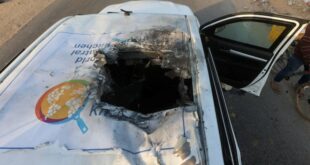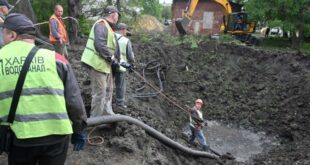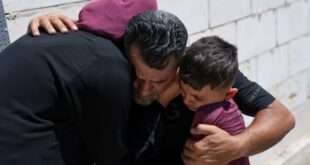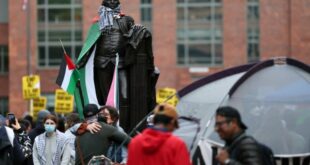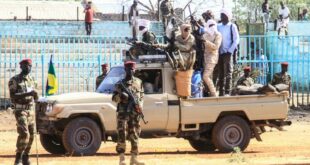Neither side appears to want a full-blown war, but it could happen anyway
In many ways, it feels as though Israel and Hezbollah have been at war for months already.
Almost constant, daily artillery and missile fire across the border with Lebanon has left dozens of soldiers and civilians dead on both sides. More than 80,000 Israeli civilians within range of the fighting have been uprooted from their homes and a drone strike Tuesday in Hezbollah's heartland of southern Beirut has pushed the temperature of the conflict to the boiling point.
Leaders in both Israel's government and Hezbollah's militia are keenly aware that a destructive war involving a possible ground invasion by Israel and the use of long range, heavy rockets by Hezbollah on Israeli cities would have momentous and devastating implications for both sides.
Nonetheless, escalation has never felt more possible than it has this week, following the killing of Hamas deputy commander Saleh al-Arouri in a drone strike that bore all the hallmarks of an Israeli assassination hit.
Twice in the four days since al-Arouri's killing, on Wednesday and again on Friday, Hezbollah's leader and senior cleric Hassan Nasrallah has appeared on video to warn that Israel's presumed attack on Lebanon will not go unanswered.
He vowed retaliation at the time and place of his group's choosing.
"The response is undoubtedly coming," Nasrallah said in Friday's speech.
"We will not remain silent about a violation of this level because this means that all of Lebanon will be exposed."
Escalation Risk
Lebanese political analyst and Hezbollah researcher Amal Saad told CBC News she believes Nasrallah will follow through on the threat.
"The response is going to be very soon," she said. "The deterrent value would be totally undermined if Hezbollah didn't respond soon, because Israel has declared its intent to keep on targeting Hamas and Islamic Jihad officials in Lebanon.
"Things are moving at a very fast pace," she added.
Saad is a lecturer at Cardiff University's School of Law and Politics in the U.K.
Hezbollah, the most powerful military player in Lebanon, is a political and military entity that answers to Iran and is a sworn enemy of both Israel and the United States.
Boasting the best-funded and well-armed militia in the region, Hezbollah has the means to make good on Nasrallah's threats.
The group wields a powerful military arsenal, far in excess of what Israel has been confronted with in its war against Hamas in Gaza.
Some reports suggest the militia could field more than 100,000 fighters and is equipped with more than 100,000 missiles and rockets, with some capable of delivering enormous 1,000-pound (450 kg) warheads.
Potentially, that's enough to devastate Israeli cities and cause major chaos and destruction throughout the country.
But Saad says she believes any retaliation ordered by Nasrallah would be calibrated so that it would deliver a political message but not necessarily compel Israel to respond with an even more vicious counter attack.
"I think the response will be an escalation, but below the threshold of high-intensity warfare, meaning all-out, full-scale war, which would elicit the kind of response that would compel Israel to bomb Beirut area," said Saad.
The killing of al-Arouri marks the first time a senior Hamas official has been targeted outside of Palestinian territory, and while the attack may not explicitly have been aimed at Hezbollah, it occurred in the midst of one of its Beirut strongholds.
Close Connections
Nasrallah routinely refers to Hamas as being part of an "axis of resistance," an informal alliance of groups and states opposed to Israel and other Western powers in the Middle East.
Analysts believe Iran is the ringleader and provides much of the arms and funding, not just to Hezbollah but also to Houthi militias in Yemen. Their fighters have been firing rockets and attacking ships near the Red Sea as part of an effort to disrupt Israel's economy and impact global trade.
Hezbollah and Israel fought a ferocious month-long war in 2006 that killed more than 1,200 Lebanese civilians and 158 Israelis, and ended with a UN-brokered settlement and peacekeepers along the Israel-Lebanon border.
A much lower-intensity shooting war flared up again after Hamas's widespread attacks on southern Israel on Oct. 7, featuring shelling and artillery strikes across the border from both sides.
Thus far, however, there has been no indication that either Israel's government or Hezbollah's leadership wants to engage in head-to-head ground combat.
In October, Israeli officials took the precautionary move of evacuating some 80,000 people from cities and communities within artillery range of Hezbollah forces, but the government of Prime Minister Benjamin Netanyahu is under pressure to get them back into their homes.
Israel has demanded that Hezbollah forces retreat to the north of the Litani River, which is roughly 20 kilometres from the border fence.
In December, Defence Minister Yoav Gallant said Hezollah must comply or Israel would "act with all the means at its disposal" to push the Hezbollah forces back.
Gallant returned to the border area Friday and after meeting with military commanders issued another statement saying "we prefer the path of a political settlement but we are close to the point where the hourglass will turn."
This week, even before the drone hit on al-Arouri, the United States had dispatched its special envoy, Amos Hochstein, to try to lower the tension and work with Lebanon's government to try to find a solution to the border standoff.
Avoiding Escalation
Despite Nasrallah's fiery rhetoric and the Israeli threats, both sides have compelling reasons to avoid further escalation.
Lebanon is facing an acute economic crisis and there appears to be little interest in going to war with Israel, meaning Hezbollah could risk a significant public backlash.
While Hezbollah forces are formidable, some analysts believe they could still expect to face substantial losses in any ground war involving Israeli troops equipped with modern Western-made weapons.
And Iran is also unlikely to want to waste Hezbollah, one of its most valuable military assets, in a futile fight.
For Israel, the risks of a wider war are equally serious, says Saad, the Lebanon analyst.
With its war against Hamas in Gaza shaping up to be a messy, prolonged fight, Israel's military resources would be stretched thin.
"I believe … it's impossible for Israel to fight on two fronts. No army in the world, especially of Israel's size, can do that," she told CBC News.
The dynamic has reinforced the uneasy standoff that's endured for the past three months, but with this week's drone strike, it may now be on the verge of disintegrating.
ABOUT THE AUTHOR

Foreign Correspondent
Chris Brown is a foreign correspondent based in the CBC’s London bureau. Previously in Moscow, Chris has a passion for great stories and has travelled all over Canada and the world to find them.
*****
Credit belongs to : www.cbc.ca
 MaharlikaNews | Canada Leading Online Filipino Newspaper Portal The No. 1 most engaged information website for Filipino – Canadian in Canada. MaharlikaNews.com received almost a quarter a million visitors in 2020.
MaharlikaNews | Canada Leading Online Filipino Newspaper Portal The No. 1 most engaged information website for Filipino – Canadian in Canada. MaharlikaNews.com received almost a quarter a million visitors in 2020.

